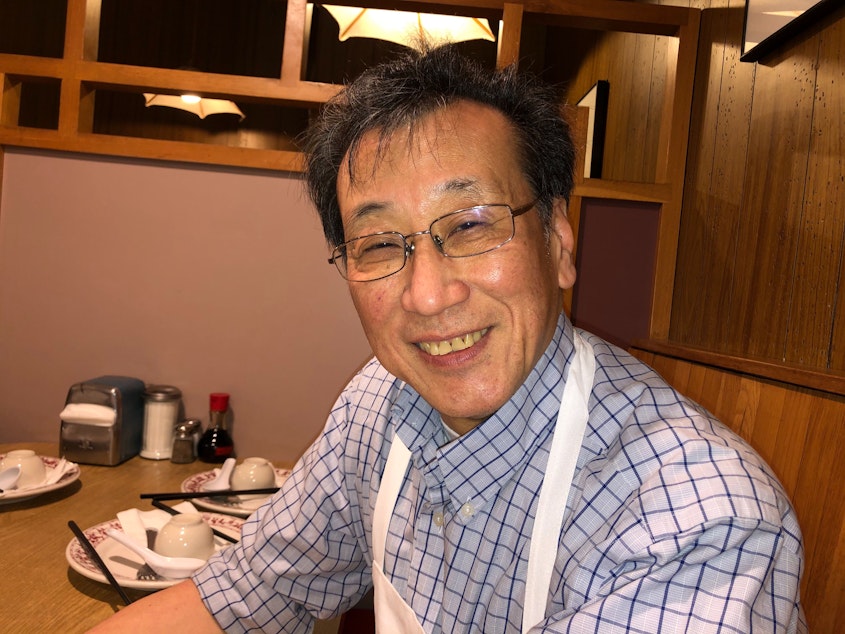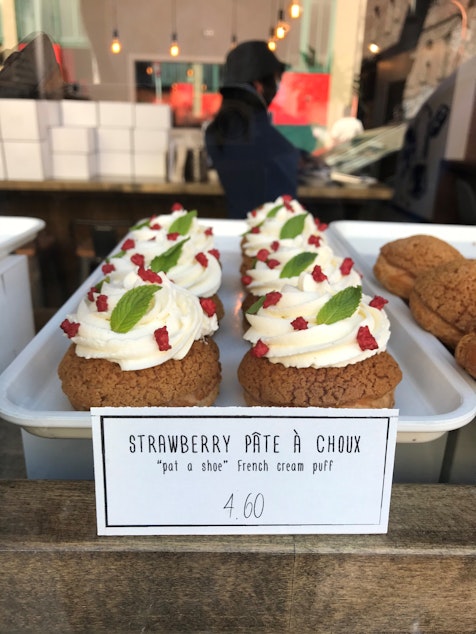Sun's out and Seattle's Chinatown bustles. But business owners say they're 'trying to survive'

There’s more foot traffic on King Street these days. Most of the storefronts that were boarded up last year have shed their plywood. People enjoy the sunny weather at Hing Hay Park, while two men battle it out at the ping pong table.
Jamie Lee, with the Seattle Chinatown International District Preservation Development Authority, says it’s a nice change to last year’s empty streets. “It’s nice to see people out again,” she said. “It’s not the same, but it’s this new sense of the way things are in the way that we’re trying to survive.”
Typically, Lee’s nonprofit focuses on affordable housing and business support. But this year, the nonprofit changed things up like delivering groceries and meals. And helping people get vaccinated.
“We really helped a lot of elders that work in the kitchens get vaccinated," Lee said. "That was really something that I never thought I’d be doing, you know!”
Over at Tai Tung, Harry Chan, the restaurant’s third-generation owner, eats a late lunch. He said his routine has mostly stayed the same. He comes to work every day.
“But I go home little early now,” said Chan. “Because we used to close at 10, on a weekend at 12, but now we close 8 o’clock every day.”
Sponsored
Chan says there’s no reason to stay up late when the neighborhood gets quiet early. “At the same time I think it’s good for the employees too. They can go home and have dinner with the family.”
Chan says the reduced hours have allowed him to keep his staff, many of them long timers. He’s not worried whether King County rolls back to Phase 2 or stays in Phase 3. He says it doesn’t make a big difference whether his restaurant is at 25 percent or 50 percent capacity. But he is thinking about slowly extending their hours, maybe on Fridays. First he wants to see whether summer will bring out more people to the neighborhood.

Up the block, a new restaurant opened last year, early in the pandemic. Katie Pohl, co-owns Susu Dessert Bar with Chef Muhammad Fairoz. Pohl said they had planned a wine bar with Singaporean and French food. But with the lockdown, they needed a Plan B. For now, at least, they’re a bakery.
Sponsored
“We have, luckily, these big, beautiful windows right here on King Street. So we were like, let’s throw all the food in the window and see what happens… and it totally works!”
Pohl said they thought they’d be selling pastries for just a couple of months. A year later, despite some progress, Covid cases are increasing, especially in King County. Pohl wonders when they’ll be able to welcome customers inside. “We really want to open for dine-in by the summer,” she said. “But I don’t know if that’s going to happen.”
For now, she and other businesses are trying to make the most of the positive changes: the good weather, people venturing out after vaccination, and the ongoing support for local businesses.
Covid isn’t the only looming issue. Ongoing violence against Asian Americans and Pacific Islanders have put people here on edge.
“Some folks are afraid to go out to walk the streets at night,” said Lee of the Seattle Chinatown International District Preservation Development Authority.
Sponsored
She and community members are trying to figure out how to help people in the neighborhood feel safe.
“How do we help our residents feel safe without necessarily asking for more police?" Lee said. "How do we take safety into our own hands and do it that’s conducive for our residents but also doesn’t increase the system of oppression?”
One thing is certain. Lee said recovery will take time, maybe even longer than the last recession. It won't be like flipping a switch.




